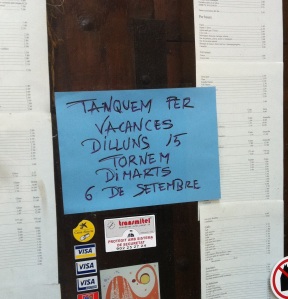Remember that kid in high school? The one whose English you laughed at, not to mention the way she dressed and wore her hair? Maybe you said a few words to her in the lunch room or if her locker was located next to yours, but you usually didn’t bother chatting with her too long because she had trouble understanding you and, let’s face it, you had nothing in common. Now take that same situation and make her a couple decades older, add couple of degrees and 5 additional countries to her list of places once called home and make the setting not school but work, and you have me. Well, first subtract all of her charm, and then you have me.
I write intensely in English all day and then must communicate and listen in Spanish. Sometimes people speak about what is going on to me and other journalists in languages I don’t understand and sometimes they speak Spanish, but sometimes I am not listening during those Spanish language moments. But if I am, I still have difficulty understanding (*sometimes. Let’s stick with the theme).
This becomes especially troublesome when unspoken rules regarding the particular content I am working on are present. I inevitably discover many of said unspoken rules by making mistakes. In fact, it is the only way I discover many of the rules, secret or not. This method of “training” is fairly standard here in Spain. And while the new kid on the block is floundering through said training, the cool kids are sitting back and rolling their eyes as mistakes pour in.
I am not suffering the cruel tricks that you all played on the exchange student, like helping her out with responses to teacher’s requests with phrases such as “why don’t YOU sit down, woman?” In fact, the people I work with are nice as well as talented and capable. But European corporate culture generally has remained old school in that there are no processes defined for how work gets done. Some have emerged organically, but nothing is documented and therefore nothing exists to pass on to any newcomers. Meaning: There is nothing to base any training on, no way to share knowledge or lessons learned nor anything to base required skills and abilities on for a job that opens up. Those jobs are largely defined around the person that previously held the job. Which means when that person goes, so does special job knowledge.
Of course, there are old school water cooler conversations for knowlege sharing that happen…but because of the subtelties of language that I am incapable of picking up on and producing, I don’t attempt to initiate casual conversations about work, that in itself is too much work. And since I’m the weird language exchange kid, I am not included anyway.
I realize this is kind of a big bitch-fest, but in a roundabout way it is also praise for the US corporate model. Not something you would generally consider when you think of the word ‘homesick’, but for me it ranks big. Like the exchange kid, my best friends, confidants and family are in my country of origen. If I have a bad day or feel lonely, I don’t have a community at work to fall back on, at least not yet anyway. (As it happens, I am feeling particularly lonely after a fantastic time with my best friends in the US. To top it off, one of my only two good friends here is leaving in July.)
So I don’t know what the exchange student did when she felt isolated. Probably nothing. Just waited to go home. Or maybe she called her mom. Me, I am just going to keep at it, there isn’t much I can do about the corporate culture and I don’t care if they think I am a crazy American. I am unmotivated to improve my Spanish because I am too tired, I am working hard. We will see this year if the trade off is worth it. If not, this exchange kid might just be heading back to her friends and family in her country of origin. (!!)














